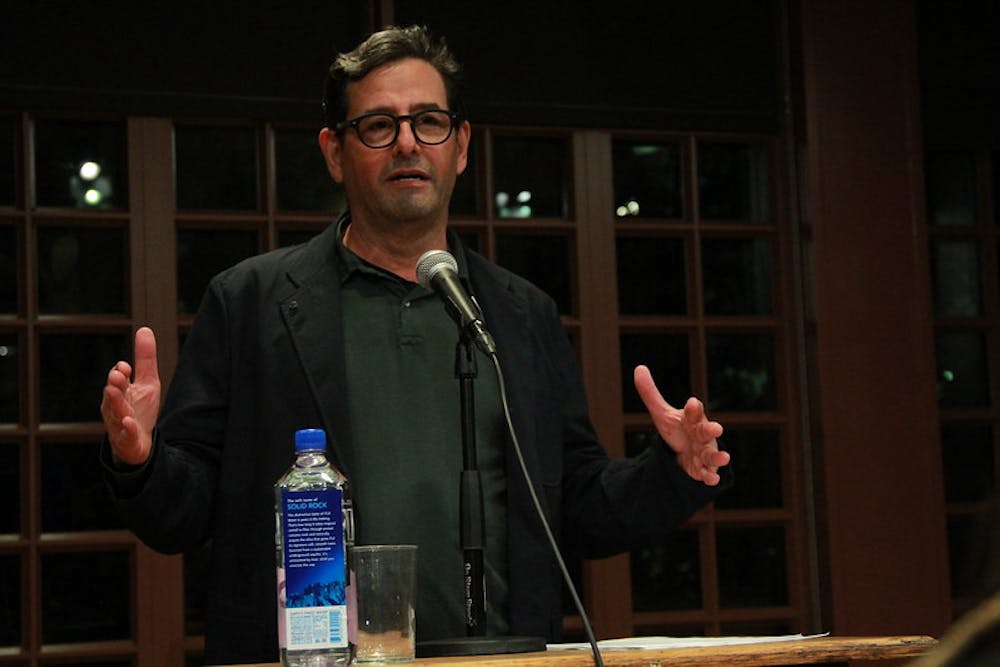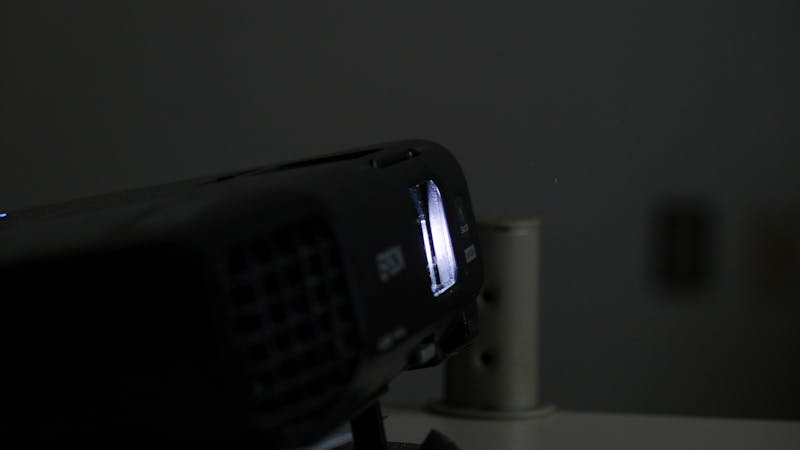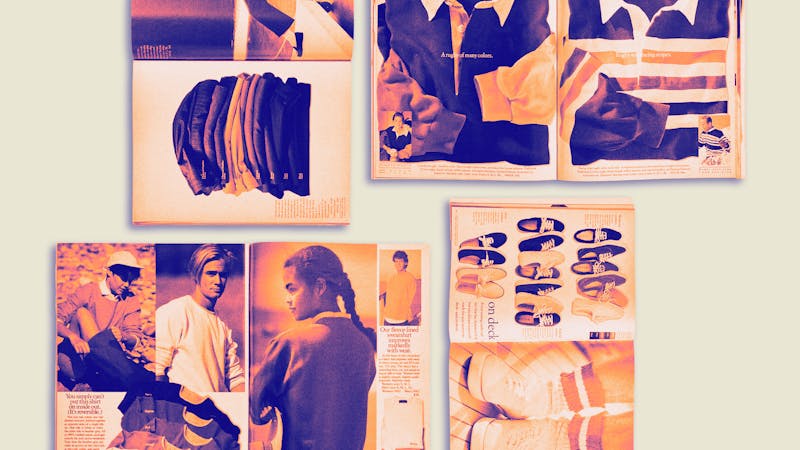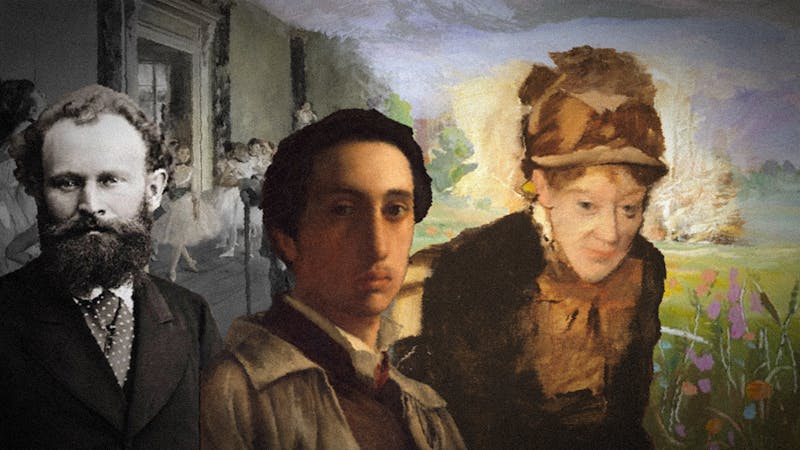The cozy, home–like atmosphere of Kelly Writers House, reminiscent of idealized 1950s movie living rooms, provided the perfect setting for a visit from one of the most outstanding creative media executives of the 21st century, Rob Sharenow. He serves as the president of programming for A+E Networks, overseeing all creative development and production for their brands. A writer, artist, cultural explorer, and businessman, Sharenow came to share his insights on failure and success in the entertainment industry. “Speaking about failures is a way to see things holistically,” he emphasized early in the evening, setting the tone for what became the event’s unofficial motto.
From the outset, Sharenow employed a self–deprecating tone, humorously noting that none of the students who attended the lecture he gave earlier in the day stayed for his second talk. Still, this didn’t discourage the guest from sharing an untraditional story of his career journey. “People want insights on how to navigate the world,” Sharenow said. “But, many Penn students are already on their way to success.” With this in mind, Sharenow chose to focus on failures as essential stepping stones to triumph, illustrating how even when life doesn’t go as planned, it can lead to unexpected and fulfilling outcomes.
Self–labeled as an underachiever with no ambition for what he’s doing now, Sharenow “had to become successful.” Being a novelist was not on the horizon during Sharenow’s high school and college years. He’s always had big dreams—some he tried to pursue for many years and some that he realized farther into his career. The interlinked chain of failure and success, for Sharenow, started with a misguided ambition of being an athlete without a proper aptitude. As the son of a high–achieving athletic father, Sharenow tried many different sports with disappointing payoff. His athletic aspirations were Sharenow’s first failure on his long road to A+E. The second was a dream to become a cartoonist.
Inspired by Peanuts, Sharenow aspired to create his own multiverse and comic strip in college. This time, he came closer to achieving his dream. During his senior year, Newsweek magazine wanted to publish Sharenow’s strip. His mom was so proud of his long–awaited “success” that she bragged to all of her friends and relatives. At the very last moment, despite having mailed Sharenow a check for his work, the magazine cut out his comics to accommodate for some editorial or breaking news. This punch in a crunch winded out his sales from cartooning and his college identity to a distinctly different field—academia.
The fact that someone was paying him to study his beloved subjects, history and literature, was both a great surprise and a great victory for Sharenow. However, he didn’t have the patience nor the stamina to get a Ph.D. in American Studies at New York University. His family was shocked when he passed the language exam required to finish the degree. Sharenow hated the amount of reading, but loved the writing component. This realization helped him to make the bold decision to drop out after four years and start approaching his real dream: to write.
The heartbreaks, however, were never the end of the story for Sharenow. They were the spaces where his imagination helped to fill these depressing gaps. Even the most crushing moments—like selling his first screenplay to Peter Weir, the producer of Dead Poets Society, only to see the project crumble when the lead actor pulled out—became turning points, teaching him resilience in an industry that thrives on uncertainty.
The story with Danny Glover, who initially agreed to become a protagonist in Sharenow’s first movie and actually captured all screenplay writer’s thoughts, was looping and ironic. All this happened during the final year of Sharenow’s Ph.D. program, just a week after he had got his check for the sold plot. Glover came to NYU and Sharenow couldn’t miss this chance to meet the actor and to speak to a person who changed his entire life. At the end of their meeting, when Sharenow approached Glover, the actor admitted that he could no longer participate in the movie and wristed away. This was another instance when everyone in Sharenow’s family knew about his forthcoming success until it suddenly turned into a failure.
After the Danny Glover era, Sharenow engaged in versatile endeavors. He was a member of a small indie rock band, until three players ditched him for a new leading man, immediately signing a contract with a major label. Then, the future A+E executive “proudly” joined the first wave of media creators, working on a CD–rom project about yo–yos. For the first in his life, Sharenow was making good money but pushing 30–years–old with no dreams that had come true.
His father’s journey served as a poignant counterpoint. A Harvard Law School graduate turned summer camp owner, Sharenow’s father rejected the prestige of corporate life for a career that made him profoundly happy. This story deeply influenced Sharenow, encouraging him to pursue what he truly loved: television writing. “Why not you?” his father had asked—a question that became a mantra for Sharenow. Soon after, he found his way into the industry, starting as a researcher and climbing the ranks to become a television executive.
Twelve years of false starts helped Rob Sharenow arrive to the point where he is now. All of his failures—which he can also describe as successes—taught him distinct lessons: cartooning represented unbelievable self–discipline, graduate school brought exposure to literature and television, band taught team management and working behind the scenes, and the digital world taught Sharenow how to believe in what one does. Finally, the world of art and entertainment helped Sharenow to understand how to manage himself. The main takeaway of the evening was to say yes. By embracing failure, setbacks, and the risk of embarrassment, we can become better versions of ourselves.






